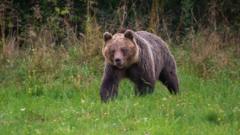In response to public safety concerns following a fatal bear attack, Slovakia's government has sanctioned the culling of 350 brown bears, raising significant opposition from environmental groups who argue it violates international laws and could exacerbate the problem.
Slovakia Approves Controversial Bear Cull Following Fatal Attack

Slovakia Approves Controversial Bear Cull Following Fatal Attack
The Slovak government moves to eliminate 350 bears after a man is killed in a forest, sparking backlash from conservationists.
The Slovak cabinet has officially sanctioned a plan to cull approximately a quarter of the country's brown bear population after a tragic attack resulted in the death of a local man. Prime Minister Robert Fico's nationalistic government confirmed the decision following a cabinet meeting, announcing the culling of 350 bears from an estimated 1,300 in the wild, asserting that the growing number of attacks poses a significant risk to human safety. "We cannot have a society where people live in fear of entering the woods," said Fico to reporters.
Following the tragic death of a 59-year-old man in Central Slovakia, whose body was discovered with severe injuries consistent with a bear attack, the state of emergency has been expanded to cover 55 of the nation's 79 districts. The government has already begun easing legal restrictions, allowing bears to be shot when they venture too close to human habitats. Reports indicate that by the end of 2024, approximately 93 bears had already been killed.
This decision has incited sharp criticism from conservationists who argue it contradicts international environmental agreements and may breach legal obligations. "This is utterly ludicrous," claimed Michal Wiezek, an ecologist and member of the opposition party, Progressive Slovakia. He suggested the government is resorting to culling as a cover for a failure to implement proactive measures against bear attacks, insisting that most encounters with bears occur without incident, and he anticipates intervention from the European Commission.
Authorities confirmed that the recent fatality was linked to a bear attack in the forests surrounding Detva, where evidence of nearby bear dens was also found. The political ramifications surrounding bear encounters have intensified, with public anxiety spiking following several incidents, including a situation earlier this year where a Belarusian woman died after being pursued by a bear.
Despite the government's intentions, experts contend that the bear population in Slovakia has remained stable around 1,270, contradicting claims that the numbers should be reduced to 800. As bears are a common sight in the Carpathian mountain range, which spans the region including Romania, Ukraine, Slovakia, and Poland, the resolution of such encounters remains a pressing concern for both authorities and the public.






















